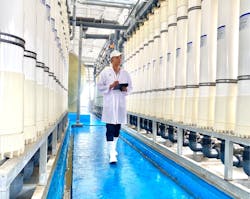CP Foods’ sustainability program shows major gains in water reduction, reuse
Charoen Pokphand Foods Public Company Limited (CP Foods), headquartered in Thailand, has recently made a sustainable strategy with focus on food security and circular economy-based operations that applies the 3Rs principle — reduce, reuse and recycle — to optimize water-use efficiency.
In 2020, 36% of water withdrawal per production unit was reduced, compared to the base year 2015. More than 40% of water was reused or recycled.
Pairoj Apiruknusit, executive vice president for aquaculture business at CP Foods, said the company has placed utmost important on safe and sustainable farming. Water resources are significant to the continuing operations of integrated agro-industrial and food business. Moreover, CP Foods is perceptive of intensified droughts that occur frequently. Therefore, the company focuses on the optimization of water usage with zero discharge practice to natural water resource.
In order to do so, the water used in the farming process is filtered by Ultra Filtration (UF) system from external sources and treated water, then it’s recirculated to be used within the shrimp farms. The company also uses the same technology in poultry processing plants, filtering treated wastewater to be used for the cooling system as well.
Apiruknusit explained that shrimp farms also use Bio-Floc to help treating waste in shrimp ponds as well as reducing the risk of developing water-borne diseases.
Other CP Foods businesses also apply the 3Rs principle in their operations by applying different solutions to optimize water-use efficiency in various production process, for instance, poultry processing plant using air chillers instead of water chillers to reduce water consumption. Feed plants reuse the residual water from the reverse osmosis filter system for non-production activities such as watering plants, cleaning roads, etc.
CP Foods continues maximum efficiency water usage throughout the production chain from upstream to downstream. Employees throughout the organization have been encouraged to use water wisely and shared recycled water to communities.
Since 2004, CP Foods has provided treated water to the communities around its swine farms to more than 200 farmers, to help reduce farming costs, mitigate impacts of drought and stabilize water sources for the communities. Water distributed to farmers is already treated using a biogas production system, which meets standards stipulated by law.
